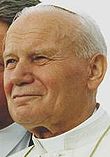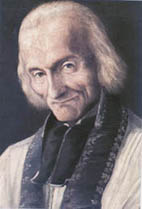
Morning offering
Encyclopedia

Pope John Paul II said that the Morning Offering is “of fundamental importance in the life of each and every one of the faithful."
Practice
The Morning offering is meant to be prayed first thing in the morning, upon waking up. Throughout the day, a Christian offers up everything – joys and successes, difficulties and sacrifices, to Jesus, uniting them to His sufferings and merits so that one’s works gain the merit they can never have apart from Him.The Morning Offering is suggested to be renewed many times throughout the day with simple short prayers (called "aspirations"), eg "I will serve!"; "I offer my work unto you."
A specific Morning offering to the Sacred Heart of Jesus was composed by Fr. Francois Xavier Gaulrelet in 1844. It reflects the Alliance of the Hearts of Jesus and Mary
Alliance of the Hearts of Jesus and Mary
The Alliance of the Hearts of Jesus and Mary refers to the historical, theological and spiritual links in Catholic devotions to the Sacred Heart of Jesus and the Immaculate Heart of Mary...
and is also an Acts of reparation
Acts of reparation
In the Roman Catholic tradition, an Act of Reparation is a prayer or devotion with the intent to repair the "sins of others", e.g. for the repair of the sin of blasphemy, the sufferings of Jesus Christ or as Acts of Reparation to the Virgin Mary...
for sins:
- O Jesus through the Immaculate Heart of Mary,
- I offer you my prayers, works, joys, sufferings of this day,
- in union with the Holy Sacrifice of the Mass throughout the world.
- I offer them for all the intentions of your Sacred Heart;
- the salvation of souls, the reparation for sin, the reunion of Christians;
- and in particular for the intentions of the Holy Father this month.
- Amen.
Theological basis and history
The Catechism of the Catholic Church 2157 states:- The Christian begins his day, his prayers, and his activities with the Sign of the Cross: "in the name of the Father and of the Son and of the Holy Spirit. Amen." The baptized person dedicates the day to the glory of God and calls on the Savior's grace which lets him act in the Spirit as a child of the Father.
"All that we do without offering it to God is wasted," Saint John Mary Vianney preached. According to Catholic theology, the worth of an action in the eyes of God is found in the intention, i.e. what takes place in the heart of each person, on whether the person lives based on the love for God (the greatest commandment) or love for self. Thus, Catholic spirituality encourages the practice of fixing one's intention towards loving God at the very beginning of the day, through the morning offering. Catholic authors also encourage repeating this offering throughout the day, especially at the start of one's professional work which takes a large part of each day.
The morning offering is an essential part of the theology of sanctification of work, or the use of work, secular or otherwise, as a means of arriving at personal sanctity. The other element in this theology is the actual work done with spirit of excellence in consonance with the intention of offering something "worthy" to the sanctity, majesty and the goodness of the Father God.

Saint Mechtilde
Saint Mechtilde
Saint Mechtilde of Hackeborn was a Saxon Christian saint and a Benedictine nun. Her feast day is celebrated as 26 or 27 February...
(1241-1298), a popular saint during the time of Dante and who was mentioned in his Divine Comedy, also had visions of Jesus Christ and transmitted the following words of Jesus: "When you awake in the morning, let your first act be to salute My Heart, and to offer Me your own . . . Whoever shall breathe a sigh toward Me from the bottom of his heart when he awakes in the morning and shall ask Me to work all his works in him throughout the day, will draw Me to him . . . For never does a man breathe a sigh of longing aspiration toward Me without drawing Me nearer to him than I was before."
It is also said that the morning offering helps "refresh and recharge" the soul, preparing the soul to face each day with the help of God himself.http://www.ourcatholicprayers.com/morning-prayers.html
The morning offering has been an old practice in the Church but it started to spread largely through the Apostleship of Prayer
Apostleship of Prayer
The Apostleship of Prayer is a group of Catholic adherents who, through the Daily Offering, unite themselves with the Eucharistic Sacrifice in which the work of our redemption is continuously accomplished. By this vital bond with Christ, they cooperate in the salvation of the world itself...
, started by Fr. Francis X. Gautrelet, S.J, and specially through the book written by another Jesuit, Reverend Henry Ramière, S.J., who in 1861, adapted the Apostleship of Prayer for parishes and various Catholic institutions, and made it known by his book "The Apostleship of Prayer", which has been translated into many languages.

